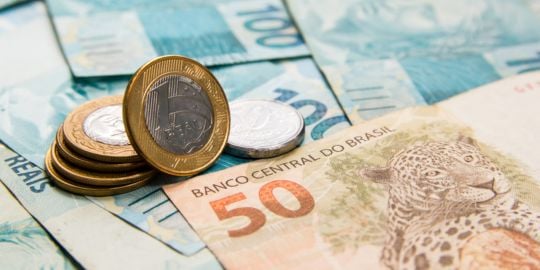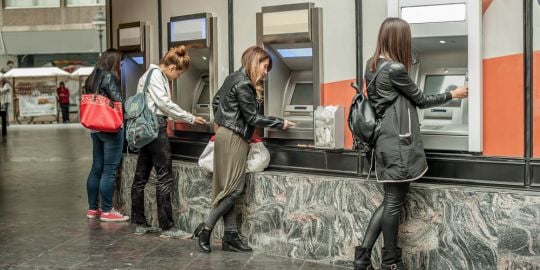Hi
I am moving back to Brazil (Salvador, Bahia) I will be living there half year and half year at the USA (I have dual citizenship). I want to keep my bank account here in Virginia and withdraw my social security pension by ATM while I am in Brazil. I am debating what is more economic to wire money from USA to Brazil every month or to just cash at the ATM. The banks that we have here all closed the branch's in Brazil (Citibank and HSBC) Anyone has advice to me? How much cam I withdraw a day at the ATM in Brazil?
Thanks for any advice
Money withdraw in Brazil
Before I obtained RNE I was only allowed $R300 per 24 hours and by 24 hours they some how they know if you withdraw 3pm on Monday you cannot withdraw until 4 pm on Tuesday om ATM's.
I had HSBC but they sold to Bradesco. Now with Bradesco I have to wire transfer $ from US to Bradeso. Banks only allow $3000.00 U$D per month unless you can advise them of a need (medical, purchase fridge, etc.) and that may take awhile to be approved.
Wire transfers from HSBC is $30 U$D and the bank in BR will keep an exchange fee.
WU was more
Texanbrazil,
Thanks so much for your reply. Since I am living in USA half of the year I do not want to direct deposit in Brazil. Yes, I am a Brazilian citizen, who live in USA for 36 years and have USA citizenship also. I will need to access about $900 a month when I am in Brazil. Do you think will be too expensive to access by ATM?
I check SSA and now no bank in BR is listed so I was wrong Sorry.
Depending on exchange you should have no issues with $900.00 per month. @ $3 per 1 real that is only about 10 ATM withdrawals.
Need to be sure the ATM/DebitCard is the same network in BR. Look at the card for the network. If not the same fees may be higher.
One other thing, would you open an account in BR? If so you can set up with your Va. bank to send a certain amount to your BR account every month once opened.
I was told BankofAmerica has accounts with most brazilian banks, worth checking out
Good tips, thanks so much for your help.
Thanks I will definitely check with Bank of America.
I bank with Bank of America in the US, and they wire my monthly "allowance" to my Banco do Brasil account, no problem. A couple of things, though:
1. There's some paperwork required at the US end, so try to work that out before you leave. It's not particularly onerous, but it's easier to do there.
2. They need monthly authorization for the wire. Tell them that you want to do it by email. They'll need to get that approved up the line, but they can - they do it for me.
3. At the Brazil end, you'll need to go to the bank personally to release the funds, 24-48 hours after BoA notifies you they've been sent. As you develop your relationships at the bank, this goes pretty fast.
4. There's a bank charge (R$95 at BB) for processing the exchange, and the IOF, Tax on Financial Operations, payable to the Receita Federal, 0.38% of the value of the transfer.
Thanks so much, I will definitely open a bank account at The Bank of America.
USAA refunds all ATM fees and the 24 hour bank ATM let's you withdrawal R$2.400 daily. Exchange rate is whatever it is at that time of the day. So I get my money here at no cost to me.
That sounds very good. Thanks so much for the information.
To cut time, headaches and expenses, if you only intend to live 6 mos every year in Brazil, you should make it as simple as possible!
1. Leave all your money in the states and don´t involve any Brazilian bank on wire transfers or direct deposits. Making such moves create more expenses due to fees on both sides , more paperwork, more waste of time and could create liabilities from both the US and Brazil in terms of taxation, transparency or maybe about money laundering if it involves big money transactions. If you have a foreign account, you have to report that to the US. In France, banks won´t even touch you because they have the obligation to report your account to the US.
2. Get your money only at ATMs, period! With 900USD to withdraw in reais, it takes 2 trips to the ATM. Only if there´s no other alternative that you wire money - and that can be done by e-mail. All other expenses, you can use your credit cards like for groceries, etc.
3. With ATMs, you get the current exchange rate through Visa or Mastercard and not the bank´s poor exchange rate through their Cambio department.
4. You can recharge at will pre-paid Visa cards issued by your bank. I use them as a back-up in case of failure from my account debit card. Sometimes bank ATM machines have card reader defects and this measure gives me peace of mind.
5. Bank lines are long in Brazil to get your money, and by ATM, you get your money after banking hours, and at your own convenience without the time consuming, patience exhausting bank line.
robal
That makes a lot of sense to me also. I know that anything that involves Banks in Brazil will be complicated.
I prefer to keep my money here in the USA and only withdraw what I need to live there. I will have to pay taxes in the USA anyway...
Thanks so much.
The difficulties of banking in Brazil are overstated by some in these threads. Trying to transact everything through your US account may work for you if you're only here six months a year (although that seems like a stretch to me) -- but only if you don't mind paying all your bills in cash, and holding all your in-country money in cash. Obviously, that seems to work for some people; not for me. You'll have to figure out what facilitates your chosen lifestyle best.
Believe me, I´ve been here for years and I use that method everyday. I was already an investor in Brazil when I was an active military in the 90´s. Internet was unheard of in Brazil and I used my checks with Chase Manhattan Bank to exchange dollars to Cruzeiros.
Fast forward, through all my difficulties in Brazil with government regulations and the daily grind with day to day living, dealing with the difference in culture , I would say that I´ve done that, did that and I´ve walked the walk.
If you can pay in cash, it´s better to avoid fraud in Brazil!
robal
It is the going to the bank all the time to pay bills. So much easier to have bill pay and barcode to scan on phone. Most bills do not arrive via mail until 2 days before due date.
Where you are depends on where you've been. I don't doubt the reality of Robal's experiences; mine have been different.
This is my second time living in Brazil. The first time was as a Peace Corps Volunteer, during the military dictatorship. I arrived back then already speaking fluent Portuguese, obviously a huge advantage. During the intervening forty-odd years I've been back many, many times, impressed each time with the country's progress. Now, I'm back for good.
I've always tried to understand and accept this almost 500 year old culture on its own terms, and adapt where possible. Whether at the bank, or the Federal Police, or the padaria on the corner, that approach has always seemed to get me to what I wanted, with minimal friction or frustration.
I go two times a month and withdrawal enough cash to pay bills. Some I pay in cash and others I deposit into my Bradesco account to pay. I would say going to the bank twice a month is not much of an inconvenience when it saves you money. I also use bill pay and scan bar codes to avoid the 2 bills that I would need to stand in a line to pay at a bank. Transferring money creates some issues I believe. ATM withdrawals don't attract too much attention and the minimal amount I actually put into my account here is a risk but very little. I keep less than R$100 in that account after bills are paid.
Some bills arrive early and some 3-5 days or never. Problematic bills, I print their boleto on line and pay in lotericas usually inside
supermarkets like Wal-Mart, Carrefour or
Safari. If I buy groceries, bills automatically
get paid. I'm always out anyway having lunch
or dinner.
I pay my cell phone bills with either my Ally or my PayPal cards. I also pay the Casas Bahias and Lojas 100 carnês with my card. In fact, about the only things I pay cash for here are the bus, lotação, and sometimes cigarettes if the store charges extra to buy them with a card. Oh, and my rent. I deposit that directly into her bank account so I have a monthly receipt.
Oh, and most of the vendors at the local feira here don't accept plastic, so I have to pay with cash there when I'm getting herbs and spices.
Update and possible correction on what I wrote above:
From November to now, I've had to go to Banco do Brasil every month to release my monthly wire transfer from the US in person. Today, they told me that I don't have to do that anymore: transfers under R$10,000 will be credited to my account automatically, without needing a signature from me.
I don't know whether this is an actual rules change, or a local reinterpretation, but it means that from now on, all of my banking here will be like it was in the States: all online, ATMs, and via app.
Too bad, in a way -- I like those people at the bank, and we won't be seeing each other anymore. ;-)
No question that automatic credit of wire transfers without need for your signature would be a quantum leap in convenience.
The potential trade-off of course is that it could also lead to a quantum leap in uncompetitive exchange rates....
So let us know if the lack of a negotiated foreign exchange contract affects the rate. For smaller amounts, it may not matter that much anyway.
Do you have to pay duo taxes on your income?
You said your income is from US but you live in Brazil. Are you paying taxes twice on that income or have you found a good loop hole?
Asking for a friend... 
Jk asking for me, since I'm considering moving to Brazil.
05/27/21
Hi, Viviexpat,
Not sure to whom your question is addressed, but this is an old thread (there are more recent ones about taxation) and I may be the only on this thread still active, so I'll respond.
Once you're a permanent resident, it's a good idea to find a Brazilian accountant you feel you can trust. Tax advice is very specific to someone's personal situation. I have some double taxation on some of the income I transfer to Brazil. Some people do not. It all depends.









